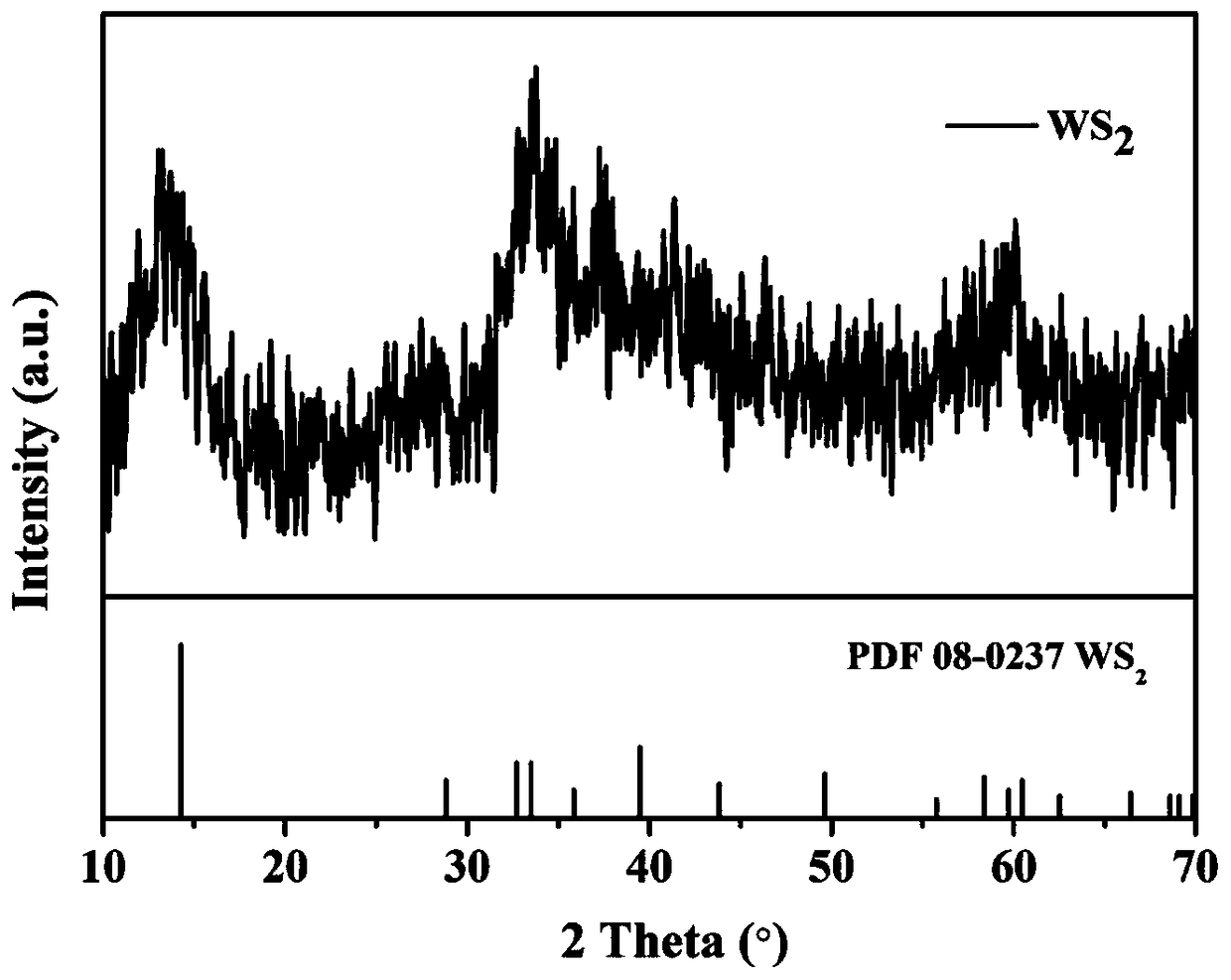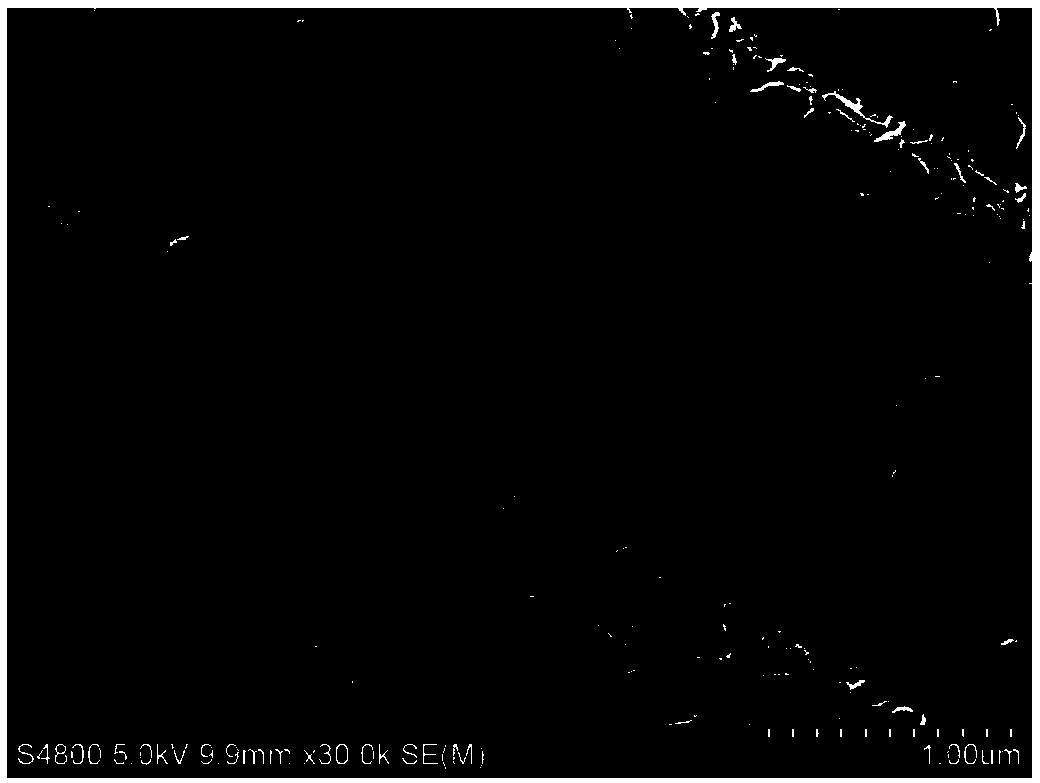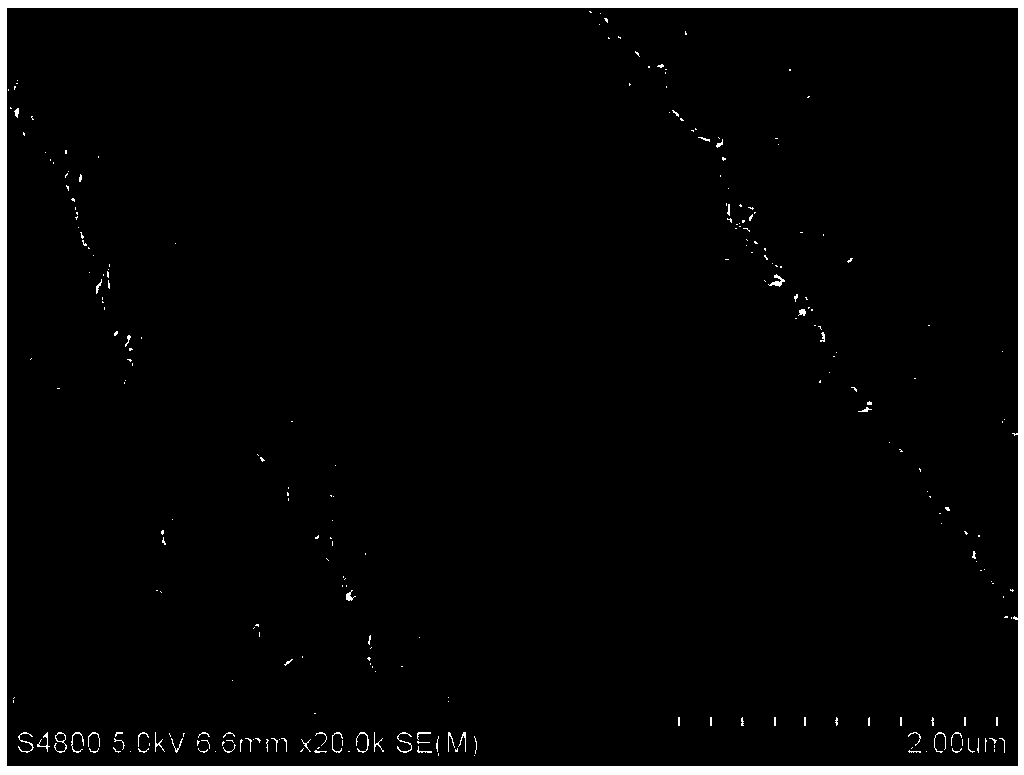Preparation method of tungsten disulfide/CFC@C multiphase composite electrode material
A technology of tungsten disulfide and composite electrodes, which is applied in nanotechnology for materials and surface science, battery electrodes, secondary batteries, etc. It can solve the problems of inability to prevent direct contact of tungsten disulfide, poor cycle stability, fast capacity decay, etc. problems, to achieve the effect of facilitating the transmission of electrons, reducing the cost of raw materials, and alleviating side reactions
- Summary
- Abstract
- Description
- Claims
- Application Information
AI Technical Summary
Problems solved by technology
Method used
Image
Examples
Embodiment 1
[0035] Step 1: Cut the carbon cloth (CFC) into a square with a size of 3cm×3cm, soak it in concentrated nitric acid solution for 1 hour for activation treatment, rinse the activated carbon cloth with deionized water and ethanol repeatedly until it becomes neutral, Dry in an oven at 60°C for 8 hours for later use;
[0036] Step 2: Add 0.2975g of tungsten hexachloride into 30mL of ethanol solution and magnetically stir until completely dissolved to form a yellow clear solution A. The stirring speed is 600r / min and the stirring time is 10min. Control solution concentration is 0.025mol / L;
[0037] Step 3: add thioacetamide in solution A, control molar ratio n(WCl6):n(CH 3 CSNH 2 )=10:1, stirred for 2h to form a uniform mixed solution;
[0038] Step 4: Put the activated carbon cloth into the above solution, put it into an ultrasonic cleaner with a power of 500W, and shake it for 8 minutes;
[0039]Step 5: Transfer the above solution and carbon cloth to a 100mL polytetrafluoroet...
Embodiment 2
[0045] Step 1: Cut the carbon cloth (CFC) into a 3cm×3cm square, soak it in concentrated nitric acid solution for 3 hours for activation treatment, and rinse the activated carbon cloth with deionized water and absolute ethanol repeatedly until neutral , placed in a 60°C oven to dry for 8 hours for later use;
[0046] Step 2: Add 0.5625g of tungsten hexachloride into 45mL of ethanol solution and magnetically stir until completely dissolved to form a yellow clear solution A. The stirring speed is 600r / min, and the stirring time is 10min. Control solution concentration is 0.0315mol / L;
[0047] Step 3: add thioacetamide in solution A, control molar ratio n(WCl6):n(CH 3 CSNH 2 )=4:1, stirred for 2h to form a uniform mixed solution;
[0048] Step 4: Put the activated carbon cloth into the above solution, put it into an ultrasonic cleaner with a power of 500W, and shake it for 8 minutes;
[0049] Step 5: Transfer the above solution and carbon cloth to a 100mL polytetrafluoroethyl...
Embodiment 3
[0055] Step 1: Cut the carbon cloth (CFC) into a 3cm×3cm square, soak it in concentrated nitric acid solution for 0.5h for activation treatment, and rinse the activated carbon cloth with deionized water and absolute ethanol repeatedly until neutral Afterwards, put into the oven of 60 ℃ and dry for 8 hours for subsequent use;
[0056] Step 2: Add 1.386g of tungsten hexachloride into 50mL of ethanol solution and magnetically stir until completely dissolved to form a yellow clear solution A. The stirring speed is 600r / min and the stirring time is 10min. Control solution concentration is 0.07mol / L;
[0057] Step 3: add thioacetamide in solution A, control molar ratio n(WCl6):n(CH 3 CSNH 2 )=9:2, stirred for 2h to form a uniform mixed solution;
[0058] Step 4: Put the activated carbon cloth into the above solution, put it into an ultrasonic cleaner with a power of 500W, and shake it for 8 minutes;
[0059] Step 5: Transfer the above solution and carbon cloth to a 100mL polytet...
PUM
 Login to View More
Login to View More Abstract
Description
Claims
Application Information
 Login to View More
Login to View More - R&D
- Intellectual Property
- Life Sciences
- Materials
- Tech Scout
- Unparalleled Data Quality
- Higher Quality Content
- 60% Fewer Hallucinations
Browse by: Latest US Patents, China's latest patents, Technical Efficacy Thesaurus, Application Domain, Technology Topic, Popular Technical Reports.
© 2025 PatSnap. All rights reserved.Legal|Privacy policy|Modern Slavery Act Transparency Statement|Sitemap|About US| Contact US: help@patsnap.com



